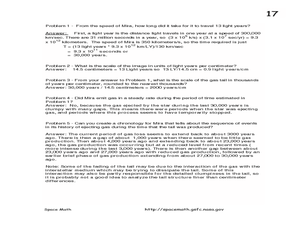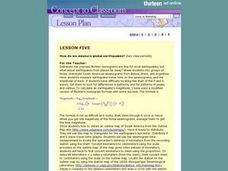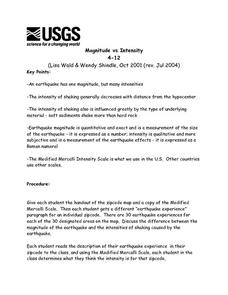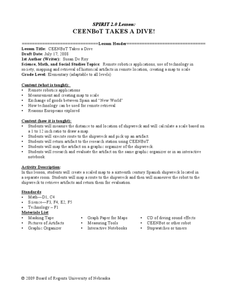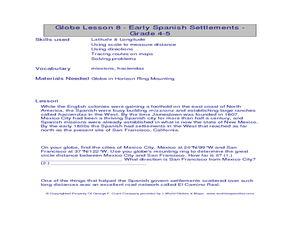Curated OER
Similar Figure Word Problems
In this algebra worksheet, students rewrite word problems using algebraic terminology and solve problems dealing with ratios. There are 12 problems with an answer key.
Curated OER
ExplorA-Pond:4th Grade Perimeter Estimation
Fourth graders visit a real pond. They mark the pond's curvilinear perimeter using string. They measure the string to find the actual perimeter of the pond.
Curated OER
Red River Contours
In this contour map activity, students use a given contour map to answer 16 questions about the area shown on the map. Topics include the gradient from one spot to another, the elevation, the direction of the flow of the Red River, the...
Curated OER
Cherishing the Water of Life
Students work in small groups to brainstorm a list of all creatures, plants, natural, and artificial processes that use or depend on fresh water. The class views an aquarium filled with water representing all the water in the world. The...
Curated OER
A Star Sheds a Comet Tail!
In this comet tails and stars worksheet, students read about the star Mira and the vast clouds of gases it emits. They use a photograph from the Galaxy Evolution Explorer satellite to solve 5 problems about the scale of the image, the...
Curated OER
Lost at Sea: The Search for Longitude
Students research and chart the shortest course to circumnavigate the globe.
Curated OER
Mapping It Out - Great Lessons For Geography
Through geography lesson plans students can learn about history, science, and a variety of other subjects.
Curated OER
How do we measure global earthquakes?
Students examine three seismograms of a recent South American earthquake recorded by USGS stations. They measure the S-P distance and use a P and S wave travel-time graph to find the epicenter distance for each seismogram. In addition,...
Curated OER
Magnitude vs Intensity
Students use a zipcode map to locate earthquake experiences based on the Modified Mercalli Scale. They discuss the difference of the magnitude of an earthquake compared to the intensity of the shaking it causes.
Curated OER
What's Its Slope
Students identify the slope of a lines.In this algebra lesson, students define the meaning of slope and write an equation given the slope. They graph linear functions using the slope and y-intercept.
Curated OER
Science: Draining the Land - the Mississippi River
Students use topographic maps to identify parts of rivers. In addition, they discover gradient and predict changes in the channels caused by variations in water flow. Other activities include sketching a river model with a new channel...
Curated OER
Similar Triangles - Applied Problems
Young scholars differentiate between similar and congruent triangles. In this geometry lesson, students identify the angles of triangles using the similarity theorem. They apply concepts of triangles to the real world.
Curated OER
Soil Composition: Then and Now
Students identify the location of their school from a 1926 digitized Soil Sample map. Using remaining landforms, they determine the type of soil identified during that time, and compare it to the soil currently found near the school.
Curated OER
Introduction to the Planets
Students become familiar with the members of the solar system and planetary order. They identify differences and characteristics of individual planets. Finally students visualize the great size of the solar system and make the image more...
Curated OER
In a Galaxy Far, Far, Far Away
Sixth graders compare distances between objects in the solar system. They investigate how light years are measured and when using them to measure how distances compare with one another. They write an essay exploring the possibility of...
Curated OER
CEENBoT Takes a Dive
Students create a map to scale using technology. In this algebra lesson, students navigate through a shipwreck to perform rescues. They use he CEENBoT program to perform the different tasks.
Curated OER
Charles Lindberghs's Flight to Paris
Students practice map skills. In this map skills lesson, students locate the cities of New York and Paris on a map. Students read about the flight made by Charles Lindbergh in May 1927 from New York to Paris. Students answer 8 questions...
Curated OER
Finding an Earthquake's Epicenter
High schoolers examine the process used to identify the epicenter of an earthquake. They identify the Richter scale and interpret a seismograph reading. They also view photographs of the aftermath of earthquakes.
Curated OER
GPS Art
Students design their own logo or picture and use a handheld GPS receiver to map it out. They write out a word or graphic on a field or playground, walk the path, and log GPS data. The results display their "art" on their GPS receiver...
Curated OER
Globe Lesson- The Revolutionary War
Students discover using globes. In this geography lesson plan, students use a globe to outline the original 13 colonies. Students also use a globe to measure the distance from London to New York City and determine how many days it would...
Curated OER
Measurement Review
Students measure the distance between two points. In this measurements lesson, students read books about birds that migrate and measure the distances that each bird flies when it migrates. Students discuss the information as...
Curated OER
The Fractal Coast
Students investigate measuring as it relates to the real world. In this geometry lesson plan, students measure distances as they discuss fractals and how it relates to measuring. They measure both linear and non-linear distances.
Curated OER
Earth Science: In Depth Look at Earthquakes
Young scholars engage in an interactive Internet lesson covering the reasons and results of earthquakes. After reading eyewitness accounts and viewing animations, they use seismograms to measure and locate the epicenters. In an ongoing...
Curated OER
Globe Lesson- Early Spanish Settlements
Young scholars use a globe. In this geography and early settlements lesson, students learn about the settlement of missions and haciendas in New Mexico. Young scholars locate Mexico City and San Francisco on the globe and determine the...






